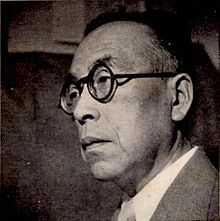Kozo Uno | |
|---|---|
 Kozo Uno, 1952 | |
| Born | November 12, 1897 |
| Died | February 22, 1977 (aged 79) Kugenuma, Fujisawa |
| Nationality | Japanese |
| Academic career | |
| Field | Political economy |
| School or tradition | Marxian economics, Marxist revisionism |
| Influences | Hegel, Marx, Sombart, Kautsky, Hilferding, Lenin, Weber, Ōuchi Hyōe, Sakisaka Itsurō |
Kozo Uno (宇野 弘蔵, Uno Kōzō, November 12, 1897 – February 22, 1977) was a Japanese economist and is considered one of the most important theorists on the field of Marx's theory of value.
He is an influential Marxist economist in Japan, where his school of thought is called the Uno School (Uno gakuha) . His main work Principles of Economics [経済原論] was published in 1950-52. Among his scholars are Thomas T. Sekine and Makoto Itoh.
Uno based his work on a rigorously Hegelian reading of Marx's Capital. This led him to his well-known conclusion that Marxian analysis had to be conducted at three separate levels:
Uno and his followers have come in for criticism from the wider Marxist tradition for insisting on this separation. Simon Clarke[2] sees this schema as "scholastic formalism", and the second level as an arbitrary addition to provide a link between the other two, rather than an analytically necessary one. As Kincaid[2] points out, though, Capital is primarily a logically rather than chronologically argued work, which looks at the laws of capitalist development and draws mainly supporting evidence from historical data. Thus, the separation of the Uno school represents an acknowledgement of this logical nature, and registers the key problem of how the critique can be linked to actual economic development in a way that competing schools often cannot.
1897[3]
1915
1918
1921
1922
1922-24[4]
1924
1925
1930
1938
1939
1940
1941
1944
1946
1947
1949
1952
1953
1954
1958
1968
1969
1972
1977